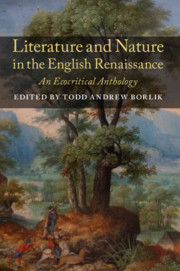Book contents
- Frontmatter
- Contents
- List of Illustrations
- Acknowledgements
- Editorial Principles: Towards the Ecocritical Editing of Renaissance Texts
- Introduction
- PART I Cosmologies
- Creation and the State of Nature
- Natural Theologies
- PART II The Tangled Chain
- PART III Time and Place
- PART IV Interactions
- PART V Environmental Problems in Early Modern England
- PART VI Disaster and Resilience in the Little Ice Age
- Appendix A Industrialization and Environmental Legislation in the Early Anthropocene: A Timeline
- Appendix B Further Reading: A Bibliography of Environmental Scholarship on the English Renaissance
Creation and the State of Nature
from PART I - Cosmologies
Published online by Cambridge University Press: 05 June 2019
- Frontmatter
- Contents
- List of Illustrations
- Acknowledgements
- Editorial Principles: Towards the Ecocritical Editing of Renaissance Texts
- Introduction
- PART I Cosmologies
- Creation and the State of Nature
- Natural Theologies
- PART II The Tangled Chain
- PART III Time and Place
- PART IV Interactions
- PART V Environmental Problems in Early Modern England
- PART VI Disaster and Resilience in the Little Ice Age
- Appendix A Industrialization and Environmental Legislation in the Early Anthropocene: A Timeline
- Appendix B Further Reading: A Bibliography of Environmental Scholarship on the English Renaissance
Summary
To understand modern attitudes towards the environment, one must begin “in the beginning,” with the Judeo-Christian creation myth. In a now notorious article, Lynn White traced the roots of our environmental crisis back to the first chapter of Genesis, when God instates humans as the overlords of creation. The Renaissance regarded the Torah as a sacred text, dictated by God to Moses. Today, most biblical scholars believe the Genesis story was cobbled together from various sources that underwent mutations and embellishments as they circulated over a four-century span between 900 and 500 bce. Cavilling with the White thesis, some eco-theologians observe that Adam derives from 'adamah, the Hebrew for earth, and insist that the “dominion mandate” stems from a Priestly version (the P-text) of the creation story, whereas the so-called Yahwist account (the J-text) in Chapter 2 promotes stewardship. The excerpt below is taken from the 1560 Protestant-slanted translation known as the Geneva Bible. This edition has been chosen for three reasons: (1) its monumental importance to Elizabethan culture and hence English literature; (2) the marginal glosses (excerpted in the footnotes) offer testimony of how Protestant theologians interpreted the scripture; and (3) the fact that the King James Version (published in 1611) is now far more widely available.
Source: The Geneva Bible (1560), 1–2, 4.
Chapter 1
In the beginning God created the heaven and the earth. And the earth was without form and void, and darkness was upon the deep, and the Spirit of God moved upon the waters. ° Then God said, Let there be light: and there was light. ° And God saw the light that it was good, and God separated the light from the darkness. And God called the light Day, and the darkness he called Night. So the evening and the morning were the first day.
Again God said, Let there be a firmament ° in the midst of the waters, and let it separate the waters from the waters. Then God made the firmament, and parted the waters, which were under the firmament, from the waters which were above the firmament: and it was so. 8 And God called the firmament Heaven. So the evening and the morning were the second day.
- Type
- Chapter
- Information
- Literature and Nature in the English RenaissanceAn Ecocritical Anthology, pp. 27 - 51Publisher: Cambridge University PressPrint publication year: 2019



